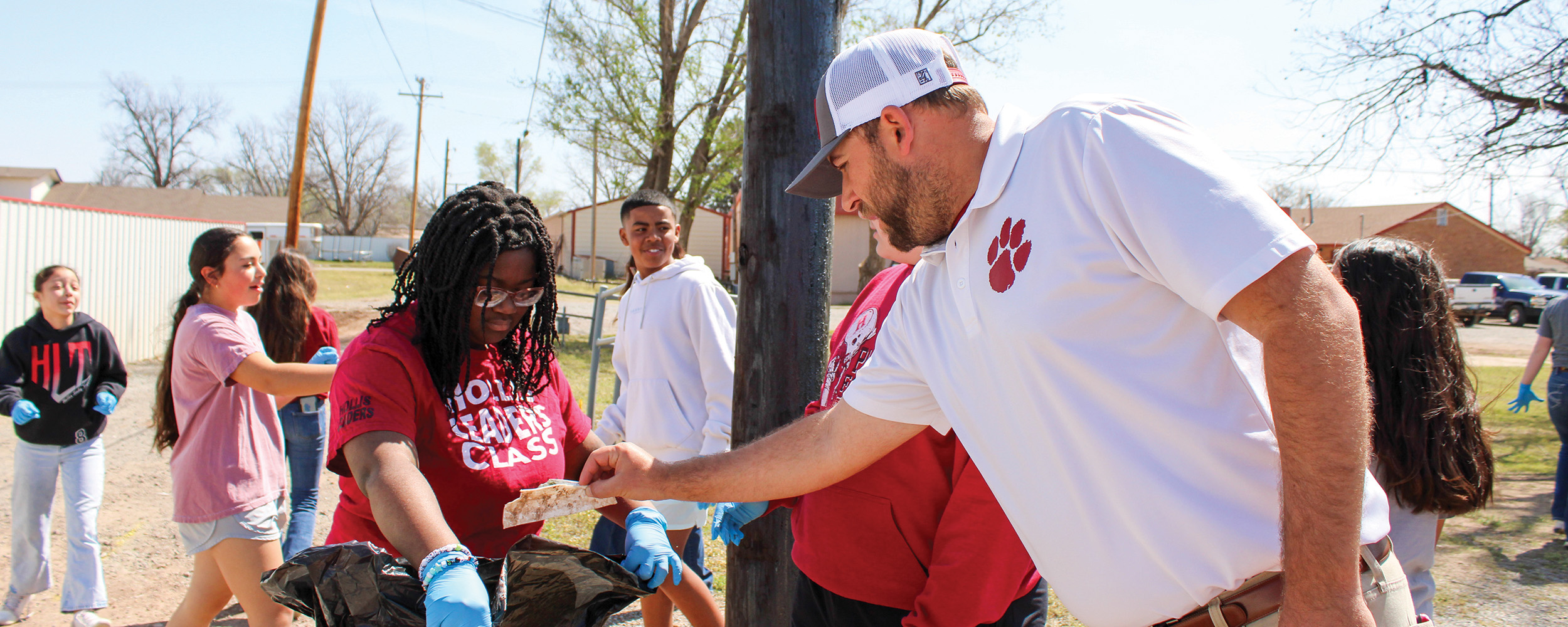
Developing leadership: OSU faculty work with middle schoolers to help improve community
Wednesday, May 21, 2025
Media Contact: Sophia Fahleson | Digital Communications Specialist | 405-744-7063 | sophia.fahleson@okstate.edu
Harmon County is one of two counties in Oklahoma to have all five stressors that affect a community negatively: high outward migration, low education, low employment, high poverty and high child poverty, according to the U.S. Department of Agriculture Economic Research Service.
This designation caused Shane Robinson, head of the Oklahoma State University Department of Agricultural Education, Communications and Leadership, to return to his hometown of Hollis, Oklahoma, to conduct research through the OSU Rural Renewal Initiative.
“The memories I have of Hollis, growing up there, are just incredible,” Robinson said. “I wouldn’t have changed my upbringing for the world. Hollis Public Schools have always been meaningful to me. My parents were school teachers there.
“I love the spirit around all things that spawn out of that school system, so that was the No. 1 reason that I wanted to try to help,” Robinson added.
He and Lauren Cline, assistant professor of agricultural leadership, worked with residents to identify the strengths and weaknesses of Hollis and presented their findings to the community in an open forum.
After one of these discussions, Kimberlee Copeland, the Hollis Middle School principal, approached Robinson and Cline to suggest they combine their findings with a new elective class she had created.
They collaborated to create and customize a curriculum to benefit the community and build civic leadership and entrepreneurship skills in the Hollis youth, Cline said. The OSU curriculum aimed to teach the students how their local government operates and how they can become involved in middle school.
The program was named Hollis LEADERS, which stood for Learning Entrepreneurship and Developing Civic Engagement for Rural Success. Copeland recruited Derick Hodges, a teacher and coach for Hollis Public Schools, to teach the new Hollis LEADERS course.
“A lot of what we know about community development is youth play a huge role,” Cline said. “Based on what we do in our department, focusing on youth is something we can do to help.”
The class combines career exploration and the OSU civic leadership curriculum to create an environment where sixth, seventh, and eighth-grade students can research opportunities for the future and improve their community today, Hodges said.
“The class is just trying to get kids interested in life after school, basically, because a lot of kids don’t know what they want to do,” Hodges said. “Let’s start them in middle school and junior high to give them an idea that there’s lots of opportunities out there.
“We can get the kids geared up for when they get into high school,” he added, “and give them something to drive toward.”
Three weeks each month are spent exploring potential career paths, and one week is spent learning the OSU curriculum. In the 2023-2024 academic year, Robinson and Cline visited the last Friday of each month to facilitate discussions with the students, learning what the students enjoyed and wanted to improve about their community.
Part of the course is a photovoice project in which students take pictures of what they think of when they think of Hollis, where they want to see the most change, and what opportunities they see in Hollis.
“It’s interesting to see what the kids actually put as what they were seeing and what they were thinking when they thought of Hollis,” Copeland said. “This is the second year we’ve done this assignment, and this year is different than last year.”
The first year’s students identified road infrastructure as the situation they wanted to improve in the Hollis community. The students then researched who to contact to repair the streets and where to find asphalt for the repairs.
Students worked with community members to coordinate two trucks to deliver asphalt and helped repair the street near their school, packing the asphalt alongside the adult workers.
“I want individuals to work intergenerationally to continue to make their communities great,” Robinson said. “Having adults work with youth for the betterment of the community is a huge win for everyone.”
The researchers hope the work, effort and relationships they have facilitated will continue long after the RRI team leaves the community, Robinson said. Each year, the students plan a larger project proposal for community development.
The first year’s students created the idea of “Hollis Remote,” a website showcasing benefits of living in their community to encourage people to move into Hollis. They aimed the website toward people with remote jobs and worked with city officials to create an office space for remote workers.
The students in this year’s group are researching grants to build an activity center in Hollis.
“I hope to continue building on what we started,” Hodges said. “If we keep going, the kids can build on maybe last year’s and this year’s projects. That’s the goal for me – to keep the kids involved. We’ve started a project. Now, let’s see it all the way through.”
Since the Hollis LEADERS project began, Shane Robinson and Lauren Cline have worked
to offer the curriculum as online modules on
learn.extension.com by 2026. The curriculum will cost $20 per student. Anyone can
use the curriculum by contacting Robinson or Cline at 405-744-5129.
Rural Renewal Initiative
- The Rural Renewal Initiative participants serve rural communities through interdisciplinary research, student mobilization and community engagement. They research effective ways to reduce vulnerabilities and build resilience through small grants.
- RRI’s Rural Scholars Program sends students to live and work in rural communities to conduct research and provide community service.
- RRI’s organizers aim to engage and expand a community of researchers and students to improve rural communities and build a future in which rural renewal movements are growing in every state and nation.
- To learn more about RRI, visit ruralrenewal.okstate.edu or email ruralrenewal@okstate.edu.
Source: Rural Renewal Initiative
Story by Sara Howard | Cowboy Journal
